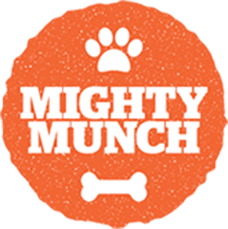As pet parents, we all want to give our dogs the happiest, healthiest lives possible, and that means finding the best ways to support their digestive health. Probiotics, beneficial bacteria known for promoting gut balance, have become a popular supplement for our pups, but are they really the answer?
Today, we’ll dive into the truth about probiotics for dogs: Do dog probiotics work, or are they just another trend in the booming pet health industry? Read on to learn whether or not probiotics are right for your dog, and how to make the most of these gut-boosting supplements.
At Mighty Munch, our powerful, vet-formulated dog probiotic is the best on the shelves. Safe for all breeds and ages, it combines three crucial bacterial strains to bring real benefits to your dog’s health, without harmful additives. You’ll be amazed by how it boosts your dog’s energy, immune system, and overall health - see for yourself today!
What Are Dog Probiotics?
Dog probiotics are live microorganisms or "good bacteria" that support a healthy balance of gut flora in your pet’s digestive system. Just like in humans, a dog’s gut is home to trillions of microorganisms that play a vital role in digestion, nutrient absorption, immune function, and even mood regulation.
Probiotics for dogs typically contain specific strains of bacteria or yeast that are safe and beneficial for canine health. These include common strains like Lactobacillus, Bifidobacterium, and Bacillus. Can you give a dog human probiotics? No - because the bacterial strains are different in our guts vs our dogs’.
Each strain offers unique benefits, such as aiding digestion, boosting the immune system, or reducing symptoms of gastrointestinal distress like diarrhea or bloating. Probiotics can be found in various forms, including powders, capsules, chewable treats, or even in some specialised dog foods.
Do Dog Probiotics Work?
So, do dog probiotics work? Let’s take a look at what the science tells us, and what leading vets have to say about introducing probiotics into your dog’s diet.
The Science Behind Dog Probiotics
How do dog probiotics work, scientifically? They introduce beneficial bacteria or yeast into your dog’s gut, where they help maintain a healthy microbial balance. The gut microbiome, home to trillions of microorganisms, affects digestion, immune response, and overall health.
When this balance is disrupted by factors such as illness, antibiotics, or stress, probiotics can help restore harmony. Research in veterinary science has shown that specific probiotic strains can survive the digestive process and colonise the gut, bringing balance to your dog’s digestive system.
Proven Benefits of Probiotics for Dogs
When we think of probiotics, we mostly think of the gut. It’s true that canine probiotics can alleviate symptoms like diarrhea, constipation, and bloating, but they do so much more than that.
Probiotics help to boost and regulate immune responses, potentially reducing the risk of infections and allergies. And, by promoting a balanced gut microbiome, probiotics optimise the breakdown and absorption of nutrients.
Good news for pet parents with anxious pups - certain probiotic strains can reduce stress-related gut issues. If your dog experiences diarrhea or appetite changes during travel or being home alone, probiotics may offer some much-needed relief.
Vet Recommendations on Probiotic Use
Do dog probiotics work, according to vets? Yes - most vets are very supportive of using probiotics, especially for dogs with digestive issues, compromised immunity, or those on a course of antibiotics. If you’re not sure whether probiotics are right for your pup, ask your vet for their opinion.
Situations Where Probiotics Are Most Effective For Dogs
Most dogs can benefit from a daily probiotic, but there are certain signs your dog needs probiotics and circumstances where they’re especially effective. For instance, antibiotics can disrupt the gut microbiome, leading to diarrhea and other issues. Probiotics help replenish beneficial bacteria, keeping your dog’s gut healthy.
Probiotics are also beneficial for any type of digestive upset. Whether caused by dietary changes, illness, or stress, probiotics can help stabilise digestion. Also, dogs with conditions like IBD or food allergies may benefit from probiotics to manage symptoms.
If you’re looking for supplements for older dogs, probiotics are a great choice. Aging dogs may experience a natural decline in gut health, which probiotics can help counteract, giving older dogs an important immune and digestive boost.
Understanding Limitations of Probiotics
While probiotics offer many benefits, they’re not a cure-all. For example, severe illnesses or complex gastrointestinal issues may require additional treatments alongside probiotics. Also, not all probiotic products are created equal - some don’t have enough live cultures or the right strains for your dog’s needs.
How Long Do Dog Probiotics Take to Work?
How long do dog probiotics take to work? To set realistic expectations, it’s helpful to understand the timeline for probiotics to show effects and how to monitor your dog’s progress along the way.
Factors That Influence Probiotic Effectiveness
The speed at which probiotics work can vary based on the type of probiotic strain. Certain strains act faster, especially for acute issues like diarrhea, while others take longer to establish in the gut.
Your dog’s specific health condition also affects how quickly you’ll see results. Dogs with mild issues may see faster results compared to those with chronic conditions like IBD. Also, high-quality probiotics with multiple live cultures are more likely to deliver quicker and more consistent results.
General Timeline for Probiotic Results
So, how long do dog probiotics take to work? For problems like diarrhea caused by antibiotics or dietary changes, noticeable improvements can occur within 1 to 3 days of starting probiotics. Managing ongoing issues like IBD or allergies may take weeks to months, as the probiotics gradually restore balance in the gut.
If you’re not dealing with a specific health issue but instead using probiotics to support your dog’s overall health, benefits like improved digestion or immune function may be subtle. Don’t worry though - the probiotics are working hard behind the scenes to keep your dog healthier and happier.
Long-Term vs Short-Term Benefits
Probiotics offer both short and long-term benefits. Rapid relief from symptoms like diarrhea, gas, or bloating can occur within a few days, but that doesn’t necessarily mean you need to stop giving your dogs probiotics once their symptoms resolve.
Regular, long-term use promotes a healthy gut microbiome, enhances nutrient absorption, and supports the immune system, contributing to your dog’s overall well-being over time. So, should I give my dog probiotics every day? Yes - if you want to see long-term benefits, daily use is best.
Monitoring Progress While Using Probiotics
Just like any new food or supplement, it’s important to keep an eye on your pup while they’re on probiotics. Watch for changes in stool consistency, frequency, and signs of discomfort such as bloating or gas - you should see improvements after a few days of probiotic use.
In some cases, there are also dog probiotics side effects to be aware of, especially if you’re using probiotics that contain additives that your dog might be allergic to. Look for signs of allergies like red or itchy skin, or biting or licking.
Tips on Maximising the Benefits of Probiotics for Dogs
Probiotics can bring a lot of health benefits, but you have to learn how to unlock them. Let’s take a look at how to make sure your dog’s probiotics are working as well as possible.
Harness the Power of Vet-Recommended Probiotics
Not all probiotics are created equal, and using the wrong type can lead to disappointing (or even harmful) results. Always choose a product specifically formulated for dogs and approved by your vet.
At Mighty Munch, we have vet-formulated probiotics that contain three powerful strains, all designed to survive and thrive in your dog’s digestive system for long-term benefits. We never add fillers or harmful additives, and our naturally delicious meal topper is safe for all breeds and ages.
As well as having the best probiotics for dogs Australia, we also have the best joint supplement for dogs. Our dog joint supplements, including our hip and joint meal toppers for dogs, offer pain relief from arthritis and other conditions, and help protect your dog’s joints against further damage.
As well as having everything you need for dog joint care, we also have premium dog supplements in Australia including dog fish oil and collagen for dogs. Browse our range today to find the best dog supplements Australia to keep your pup healthy and active for longer!
Pair Probiotics With a Balanced Diet and Regular Exercise
Probiotics work best when combined with a healthy lifestyle. Feed your dog a balanced diet rich in high-quality protein, healthy fats, and fibre, which nourishes gut bacteria and enhances probiotic effectiveness.
If you need some tips, check out our guides on homemade toppers for dog food and the best dog food for arthritis Australia. Also, regular exercise promotes digestive health by reducing stress, which can disrupt the microbiome.
Introduce Probiotics Gradually
When starting a probiotic regimen, introduce it slowly to give your dog’s digestive system time to adjust. Begin with a smaller dose and gradually increase to the recommended amount over a few days.
This approach reduces the risk of temporary side effects, such as gas or mild diarrhea, which can occur as the gut adapts to the new bacteria. What age can I give my dog probiotics? Mighty Munch probiotics are safe for all ages!
Proper Storage Guidelines
Probiotics are sensitive to temperature, moisture, and light, and improper storage can compromise their effectiveness. Always follow the manufacturer’s storage instructions - many require refrigeration to maintain live cultures. Ensure the packaging is sealed tightly to protect the probiotics from air and humidity.
Combine Probiotics With Prebiotics
Prebiotics are non-digestible fibres that act as food for probiotics, helping them thrive in your dog’s gut. Look for supplements or foods containing prebiotic ingredients such as inulin or chicory root. Combining probiotics with prebiotics (often called synbiotics) can enhance the effectiveness of the beneficial bacteria.
Stay Consistent and Patient
What time of day should I give my dog probiotics? It doesn’t really matter, as long as you’re consistent - consistency is key to reaping the long-term benefits of probiotics. Give your dog probiotics at the same time each day, preferably with food.
Be patient, as some benefits, especially for chronic issues, may take weeks to become noticeable. Keep track of your dog’s progress and talk to your vet if you’re not seeing any signs of improvement.
Parting Thoughts on the Benefits of Probiotics for Dogs
So, do dog probiotics work? Yes - they play a vital role in maintaining and improving your dog’s health, particularly when it comes to digestion, immune support, and overall well-being. They can help address common issues like diarrhea, food sensitivities, or stress-related gut imbalances.
Opt for high-quality, vet-recommended products like Mighty Munch probiotic meal toppers. Our powerful probiotics contain three separate canine-specific strains, designed to boost your dog’s gut health without the need for medications.
Give your dog’s gut a little love - shop Mighty Munch probiotics today!


